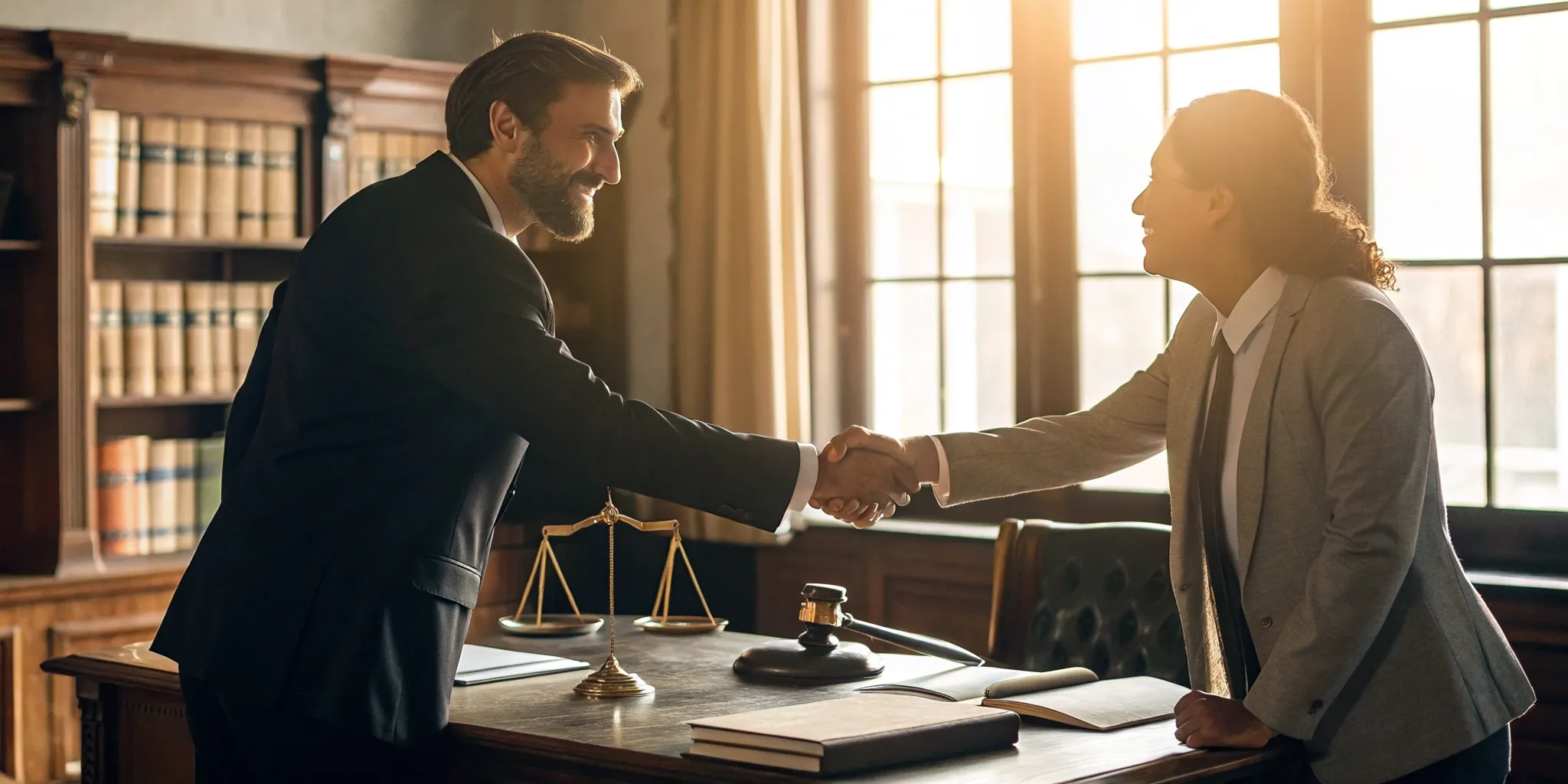A single stone tossed into a pond creates a small ripple. But when hundreds of stones are tossed in at once, they create a powerful wave that can’t be ignored. A mass tort case works in a similar way. Your individual injury claim is that single stone—important and valid on its own. But when combined with the claims of many others hurt by the same product or company, it becomes part of a powerful wave of accountability. The person who helps organize this effort is a mass tort lawyer. They are the expert who understands how to gather these individual stories and present them as a unified force for justice. This guide will walk you through what you need to know to find a mass tort lawyer to help turn your ripple into a wave.
Key Takeaways
- Your Claim Remains Your Own: Even when your case is grouped with others who were harmed by the same product, a mass tort lawsuit focuses on your individual damages. Your compensation is calculated based on your specific medical bills, lost income, and personal suffering.
- Prioritize Proven Mass Tort Experience: These complex cases require a legal team with a specific track record of success against large corporations. Look for a firm with the financial resources, expert networks, and dedicated staff needed to see the fight through to the end.
- Seek Justice Without Upfront Costs: Don’t let financial worries stop you from exploring your options. Reputable mass tort attorneys work on a contingency fee basis, meaning they cover all case expenses and only get paid if you receive a settlement or award.
What Is a Mass Tort Lawyer?
When you’ve been injured by a product or substance, it can feel like you’re fighting a lonely battle, especially against a large corporation. But what if you discovered that hundreds, or even thousands, of other people were harmed in the exact same way? This is where a mass tort lawyer comes in. Think of them as a specialized type of personal injury attorney who represents groups of individuals who have all been hurt by the same negligent act or defective product.
These lawyers are experts at handling complex cases against powerful opponents. They understand how to gather the extensive evidence needed to prove that a company’s actions caused widespread harm. While they manage claims for many people at once, their focus remains on securing justice for each individual client. They work to get you compensation for your specific damages, including medical expenses, lost income, and the personal suffering you’ve endured. A skilled mass tort attorney is your strongest advocate in these large-scale legal fights, ensuring your voice is heard and your unique losses are addressed. They have the resources and experience to take on well-funded corporate legal teams, leveling the playing field for everyday people. Their goal is not just to win a case, but to make sure you receive the financial support you need to recover and move forward with your life.
What Is a Mass Tort Case?
A mass tort case arises when a single source of negligence harms numerous people. Imagine a widely prescribed medication is later found to cause a serious health condition, or a manufacturing plant contaminates a local community’s water supply. The legal claims that follow from these events are considered mass torts. While the cause of injury is the same for everyone, the impact can be very different from person to person.
This is why, in a mass tort, each person’s claim is treated individually. The court will look at your specific injuries, your medical records, and how the harm has affected your life and finances. This approach combines the efficiency of grouping similar cases with the personalized attention needed to secure fair compensation for your unique situation.
Mass Tort vs. Class Action: What’s the Difference?
It’s easy to confuse mass torts with class actions, but there’s a crucial distinction in how they work. In a class action, a large group of people with nearly identical claims are joined into a single lawsuit. One or a few individuals act as “class representatives” for the entire group, and any settlement or award is divided among all members.
A mass tort is different. Here, each person files their own individual lawsuit. These separate cases are often consolidated before a single judge to streamline the process for things like evidence gathering, but your claim remains your own. This individual approach means your specific damages are calculated based on your personal circumstances, which can result in a more tailored outcome. Understanding the difference between mass torts and class actions is key to knowing what to expect.
What Kinds of Cases Do They Handle?
Mass tort lawyers take on cases across several major categories where a single product or event has caused widespread injury. One of the most common areas involves dangerous pharmaceuticals, where a drug approved for the market is later discovered to have severe, undisclosed side effects.
Another significant area is defective products, which can include anything from faulty medical devices and implants to unsafe children’s toys or automotive parts. Environmental contamination and toxic torts are also frequent sources of mass tort litigation, covering situations like chemical exposure at a workplace or polluted drinking water. If a company’s negligence has harmed a large group of people, a mass tort lawyer has the expertise to hold them accountable.
What to Look For in a Mass Tort Lawyer
Choosing the right lawyer can feel overwhelming, especially when you’re already dealing with an injury or illness. But finding the right legal partner is the most important step you can take. Mass tort cases are incredibly complex and require a specific set of skills and resources. You need more than just any attorney; you need a dedicated advocate who understands the unique challenges of this legal area. When you start your search, focus on finding a firm that not only has the right qualifications on paper but also makes you feel heard and supported. Think of this as building a team for your fight—and you want the very best players on your side.
Proven Experience and Expertise
When you’re facing a large corporation, experience is non-negotiable. Mass tort cases, especially those involving toxic torts, are a different beast than a standard personal injury claim. They require deep, specialized knowledge of science, medicine, and complex legal procedures. As one legal expert notes, “A lawyer who hasn’t handled mass tort cases may not be prepared for their complexities.” You need an attorney who has been in this arena before and understands the tactics defendants use. Ask direct questions about their experience with cases like yours. Have they successfully litigated against the same company? Do they have a network of scientific and medical experts? This specific expertise is often the deciding factor in a case’s success.
Clear Communication Skills
You deserve to know what’s happening with your case every step of the way. A good lawyer will be your partner and guide, translating complicated legal jargon into plain English and keeping you informed about progress and potential setbacks. Transparency is key. If a lawyer seems evasive, gives vague answers, or isn’t upfront about their strategy and fees, consider it a major red flag. You should feel comfortable asking questions and confident that you’ll get a straight answer. The attorney-client relationship is built on trust, and that starts with open, honest communication. You’re going through enough already; you shouldn’t have to chase your lawyer for updates.
A Strong Team and Resources
A single lawyer, no matter how brilliant, can’t win a mass tort case alone. These lawsuits require a massive investment of time, money, and manpower to stand a chance against well-funded corporate legal teams. Your lawyer needs a strong support staff of paralegals, investigators, and case managers. They also need access to top-tier medical and scientific experts who can provide crucial testimony. A well-resourced firm will have the financial stability to cover the high upfront costs of litigation, from filing fees to expert witness retainers. When vetting a firm, ask about the team that will be working on your case and the resources they have to see it through to the end.
A Sterling Professional Reputation
A lawyer’s reputation within the legal community speaks volumes. Look for attorneys who are respected by their peers and have a clean record with their state bar association. You can often find this information through online searches, legal directories, and client testimonials. A strong reputation is earned through years of ethical practice, professionalism, and successful advocacy for clients. Attorneys who are known for being thorough, prepared, and formidable in court are the ones defendants take seriously. This can directly influence settlement negotiations and the overall trajectory of your case. Don’t hesitate to look for reviews or ask for references—a reputable lawyer will have nothing to hide.
A Verifiable Track Record of Success
While past results don’t guarantee a future outcome, a history of success is a powerful indicator of a lawyer’s competence. You want a firm that doesn’t just take on mass tort cases but wins them. When you consult with a potential attorney, ask about their track record with similar claims, such as those involving defective products or medical injuries. As one legal publication puts it, “If the lawyer you’re considering has worked on many mass torts before and won them, that is a positive sign.” A firm that is proud of its results will often share case studies or settlement amounts on its website. This isn’t about bragging; it’s about demonstrating their ability to deliver for their clients.
Common Examples of Mass Tort Cases
Mass tort cases can feel complex, but they usually boil down to one thing: a large group of people being harmed by the same product, substance, or action. These situations can arise in many different industries, from healthcare to manufacturing. Understanding some common examples can help you see if your own experience fits into a larger pattern of negligence. Here are some of the most frequent types of mass tort claims we see.
Dangerous Pharmaceuticals
We trust medications to help us, but sometimes they cause unexpected harm. A mass tort case can arise when a pharmaceutical company markets a drug without properly warning doctors and patients about serious side effects or long-term health risks. These cases hold drug manufacturers accountable for failing to ensure their products are safe. If you or many others have suffered from unforeseen complications after taking a specific medication, it could be grounds for a medical injury claim. The focus is on the shared experience of harm caused by a single, widely distributed drug.
Defective Medical Devices
Similar to dangerous drugs, medical devices like hip replacements, surgical mesh, or pacemakers can also be the subject of mass tort litigation. These cases happen when a device has a design or manufacturing flaw that causes it to fail, leading to pain, injury, or the need for additional surgeries for many patients. Companies have a responsibility to produce safe and effective medical equipment. When they fail, and a large number of people are hurt as a result, a mass tort lawsuit can provide a path to compensation for those affected by these defective products.
Environmental and Chemical Hazards
Sometimes, the harm comes from the environment around us. Mass torts often involve situations where an entire community is exposed to pollution from a factory or contaminated drinking water. When a company’s actions lead to widespread illness due to environmental contamination, they can be held responsible. These cases bring together individuals who have suffered health problems, such as cancer or respiratory issues, because of a shared exposure. These claims are a powerful way to seek justice for large-scale environmental negligence and are a key part of toxic torts law.
Unsafe Consumer Products
Beyond medical items, everyday consumer goods can also cause widespread harm. Think of things like faulty appliances that cause fires, contaminated food products that lead to illness, or children’s toys containing hazardous materials. When a company releases an unsafe product to the market, it can injure thousands of consumers. Mass tort lawsuits help people recover costs for their injuries, lost income, and other damages. More importantly, these cases push companies to prioritize safety and prevent future harm from other defective products.
Toxic Exposure Claims
This category can overlap with others but specifically focuses on harm caused by exposure to hazardous substances. This could happen in a workplace where employees weren’t given proper protection, or through consumer products containing asbestos or other dangerous chemicals. For example, if a group of people develops a specific type of cancer after using the same product for years, it may be due to toxic exposure. These toxic torts cases are essential for holding companies accountable when their negligence leads to serious, long-term health consequences for a large number of individuals.
How to Know if You Have a Mass Tort Claim
Figuring out if your injury is part of a larger legal case can feel like a huge task, but it starts with a few straightforward questions. A mass tort claim arises when many people are harmed by the same product, substance, or action. If you suspect your situation fits this description, you’re not alone, and there are clear steps you can take to understand your options. The key is to look for a pattern and gather the right information from the start.
Signs You Might Have a Case
The most significant sign of a mass tort case is a shared experience. Think about whether the harm you suffered was caused by something that affected a large group of people. For example, did a widely prescribed medication cause a serious side effect? Did a specific model of a medical implant fail for you and many others? These situations, where a single source causes widespread harm, are the foundation of mass torts. If you’ve seen news reports or online forums discussing problems with the same defective product that injured you, it’s a strong indicator that you may have a claim. The core idea is that your injury isn’t an isolated incident but part of a bigger problem.
Documents You’ll Need to Gather
Before you can build a case, you need to build your story with proof. Start by collecting every piece of paper and digital file related to your injury. This includes all medical records, from the initial diagnosis to treatment plans and billing statements. If your case involves a product, find the receipt or proof of purchase. You should also save any packaging, instructions, or warranty information. It’s also helpful to gather any correspondence you’ve had with the company, like emails or letters. Organizing these documents will give your attorney a clear picture of your medical injury and its connection to the defendant’s product or actions.
Know Your Deadlines (Statute of Limitations)
Every state has a legal deadline for filing a lawsuit, known as the statute of limitations. For personal injury cases, this is typically two to three years from the date you were harmed or the date you reasonably should have discovered your injury. This distinction is crucial. For example, you might not realize a medication caused your health problems until years after you took it. Once that deadline passes, you generally lose your right to seek compensation, no matter how strong your case is. Because these timelines can be complex, it’s vital to contact an attorney as soon as you suspect you’ve been harmed to protect your legal rights.
Tips for Preserving Evidence
The evidence you have is the backbone of your claim, so it’s essential to protect it. If your injury was caused by a physical product, do not throw it away, alter it, or attempt to repair it. Keep it in a safe place exactly as it was when the incident occurred. Take clear photos and videos of the product, your injuries, and anything else relevant to the situation. It’s also a great idea to keep a simple journal. Write down your symptoms, document your medical appointments, and note how the injury impacts your daily life. This detailed record can become powerful evidence in any future personal injury claim.
How to Find the Right Mass Tort Lawyer
When you’re dealing with the fallout from a defective product or toxic exposure, the last thing you need is the stress of a complicated lawyer search. Finding the right legal partner is a crucial step, but it doesn’t have to be overwhelming. The key is to know where to look and what to look for. By breaking the process down into a few manageable steps, you can confidently find an attorney who has the experience and resources to handle your case.
Think of it as building your support team—you want the most qualified and dedicated people in your corner. A great mass tort lawyer does more than just file paperwork; they become your advocate, guiding you through a complex legal system while you focus on your health and well-being. They have the specific knowledge needed to take on large corporations and the resources to see a case through to the end. From investigating your claim to negotiating with powerful opponents, their expertise is invaluable. The following strategies will help you cut through the noise and identify the legal professionals best equipped to fight for you.
Research Leading Mass Tort Law Firms
A great starting point is to look at law firms with a national reputation for handling mass tort cases. These firms have the deep resources, specialized knowledge, and proven history required to take on powerful corporations. They’ve built their names on securing significant results for people just like you. At Counsel Hound, we connect you with a network of highly-qualified attorneys who specialize in areas like defective products and toxic torts. Researching established firms can give you a solid benchmark for what a top-tier mass tort practice looks like and help you understand the level of experience you should expect from your legal team.
Use Online Legal Directories
Online legal directories are like a phone book and a review site rolled into one. They can be incredibly helpful for finding and vetting potential attorneys in your area. Websites like Avvo and Justia allow you to search for lawyers by specialty, read client reviews, and see peer endorsements. This gives you a more complete picture of an attorney’s professional reputation and how they treat their clients. You can quickly create a shortlist of candidates who have a strong background in mass tort litigation and positive feedback from the people they’ve represented, helping you make a more informed decision.
Check Bar Association Resources
For a more formal and vetted approach, turn to your state or local bar association. These professional organizations are responsible for licensing and regulating lawyers, and most offer a lawyer referral service. This isn’t just a random list; the attorneys included are typically required to meet specific standards of experience and maintain a good standing. Using a bar association referral can give you peace of mind, knowing you’re being connected with a credible and qualified professional who is recognized by their peers in the legal community. It’s a reliable way to find competent legal help near you.
Ask for Professional Referrals
Sometimes the best recommendations come from trusted professionals outside of the legal world. Don’t hesitate to ask people you already have a professional relationship with, like your family doctor, a therapist, or even a financial advisor. These individuals often have networks that include reputable attorneys and may be able to point you toward someone they know and trust. A personal referral can be a powerful starting point, as it often comes with an implicit vote of confidence in the lawyer’s character and professional ability. It’s a great way to find someone who is not only skilled but also respected within the community.
How Legal Fees Work in Mass Tort Cases
The thought of legal fees can be intimidating, especially when you’re already dealing with an injury and financial stress. But in mass tort cases, the payment structure is designed to protect you. Most reputable firms, including those in the Counsel Hound network, operate on a system that removes the financial risk from your shoulders. This approach allows you to seek justice without paying anything upfront. Understanding how these fees work is the first step toward feeling confident in your decision to pursue a claim. It’s simpler than you might think and is centered around a single idea: you don’t pay unless your case is successful.
What Is a Contingency Fee?
A contingency fee is a payment arrangement where your lawyer’s fee is “contingent” on winning your case. You don’t pay any attorney fees upfront or out of pocket. Instead, the law firm receives a pre-agreed-upon percentage of the final settlement or award. This percentage typically ranges from 25% to 40%. This model ensures your legal team is just as motivated as you are to achieve the best possible outcome. At Counsel Hound, we connect you with proven attorneys who work on a “no fees until we win” basis, aligning their success directly with yours and ensuring you have access to top-tier legal representation without any initial financial burden.
Who Covers Additional Case Costs?
Beyond attorney fees, a lawsuit involves other expenses. These can include court filing fees, the cost of hiring expert witnesses to testify, and expenses for gathering medical records. In a mass tort case, these costs can add up. However, your law firm will typically cover these expenses upfront on your behalf. When your case is resolved, these costs are deducted from the total settlement amount before the final distribution. It’s essential to have a clear conversation with your attorney about how these specific costs are handled so there are no surprises. This transparency is a hallmark of a trustworthy personal injury firm and something you should expect from your legal team.
The Benefits of a Free Consultation
A free consultation is your opportunity to discuss your situation with a legal professional without any cost or obligation. It’s a crucial first step where you can share the details of your case, ask all your pressing questions, and get an honest assessment of your legal options. This initial meeting helps determine if your case qualifies for a mass tort lawsuit and allows you to get a feel for the law firm. It’s a risk-free way to gather information and decide on your next move. We encourage you to schedule a free consultation to get the clarity you need to move forward with confidence and peace of mind.
Red Flags to Avoid When Choosing a Lawyer
Choosing a lawyer is a big decision, especially when you’re dealing with the stress of a personal injury. While finding an attorney with the right qualifications is key, it’s just as important to know what to watch out for. The wrong legal partner can add frustration to an already difficult situation, leading to poor communication, missed deadlines, and a disappointing outcome.
Think of your initial consultations as interviews—you are hiring someone for a critical job. Pay close attention to how they communicate, the promises they make, and their willingness to answer your questions directly. A trustworthy attorney will be transparent and make you feel supported, not pressured. Spotting the red flags early on can save you a lot of trouble down the road and help you find a legal team that truly has your best interests at heart. Here are five major warning signs to keep on your radar.
Lack of Relevant Experience
Mass tort cases are not your average lawsuit. They involve complex scientific evidence, multiple plaintiffs, and powerful corporate defendants. A lawyer who primarily handles car accidents or wills may not be equipped for the unique challenges of a toxic torts case. When you speak with a potential attorney, ask specifically about their experience with cases like yours. If they don’t have a proven track record in mass tort litigation, they may lack the specific knowledge and resources needed to build a strong case on your behalf. Don’t be afraid to ask for examples of similar cases they’ve handled and their outcomes.
Poor or Infrequent Communication
From the very first interaction, pay attention to how a law firm communicates. If it takes them days to return your initial call or they seem rushed and dismissive during your consultation, consider it a major red flag. These early communication issues are often a preview of what’s to come. You deserve an attorney who listens to your story, answers your questions clearly, and keeps you informed about your case. A firm that makes it easy to contact them and responds promptly shows that they value you as a client and are organized enough to manage their caseload effectively.
Unrealistic Guarantees
If a lawyer promises you a specific settlement amount or guarantees a win before they’ve even thoroughly reviewed your case, you should be skeptical. The legal process is full of variables, and no ethical attorney can predict the future. Reputable lawyers will offer a realistic assessment of your case, explaining both its strengths and weaknesses. They should talk about potential outcomes, not make concrete promises. Be wary of anyone who sounds more like a salesperson than a legal advocate. Their job is to fight for the best possible result, not to sell you an unrealistic dream.
Vague or Hidden Fees
Transparency about legal fees is non-negotiable. Most mass tort lawyers work on a contingency fee basis, meaning they only get paid if you win your case. This arrangement should be explained to you in plain language, with a clear percentage outlined in a written agreement. If a lawyer is evasive when you ask about their fees, court costs, or other expenses, it’s a sign that you should walk away. A trustworthy firm will be upfront about all potential costs from the beginning. At Counsel Hound, our team is committed to transparency and operates on a “no fees until we win” basis, which we explain in our free consultations.
Limited Staff and Resources
Mass tort litigation requires a tremendous amount of resources. These cases involve investigating claims for hundreds or even thousands of clients, hiring expert witnesses, and battling large corporations with deep pockets. A small firm or solo practitioner may not have the financial backing or support staff to handle such a massive undertaking. During your consultation, ask about the size of their team and the resources they can dedicate to your case. A firm with a strong network of experienced attorneys and a dedicated support staff is better prepared to see your case through to the end.
What to Expect After You Hire an Attorney
Deciding to hire an attorney is a huge step, and it’s natural to wonder what comes next. Once you’ve signed on with a legal team, the process of building your case begins. While your lawyer will handle the complex legal work, you still play a vital role. Knowing what to expect can make the entire process feel more manageable and less stressful. Your attorney becomes your advocate, dealing with the defendants and the court system so you can focus on your well-being. Let’s walk through the key phases you’ll encounter after you’ve made that important decision to get legal help.
The Paperwork You’ll Provide
First things first, your legal team will need to gather all the evidence related to your case. You are the primary source for much of this information. Be prepared to provide documents like medical records, bills, photos of your injuries, and any correspondence you’ve had about the incident. If your case involves a defective product, you might need to provide proof of purchase or the product itself. The more organized you are, the smoother this part will go. Once you hand over these documents, your attorney takes charge of all communication, so you won’t have to deal with calls from insurance companies or the opposing side.
A Realistic Case Timeline
It’s important to understand that mass tort cases don’t resolve overnight. Because they involve many people and complex evidence, these cases can take months or even years to move through the legal system. Your attorney will give you a general idea of the timeline, but it’s an estimate. There will be periods of intense activity followed by times when it seems like nothing is happening. This is a normal part of the process. An experienced legal team knows how to handle these long-haul cases and will work diligently behind the scenes, even when things seem quiet on your end.
Your Role in the Legal Process
While your lawyer handles the legal strategy, your participation is key to a successful outcome. Your main role is to be responsive and truthful. Provide all the documents your team requests in a timely manner and be available for phone calls or meetings. It’s also crucial to keep your attorney updated on any changes in your medical condition or if you’re contacted by anyone regarding your case. Think of it as a partnership—you provide the personal details and facts, and your legal team uses that information to build the strongest case possible for your personal injury claim.
How to Communicate With Your Legal Team
Open communication is the foundation of a good attorney-client relationship. Your legal team should keep you informed about major developments in your case, but you should also feel comfortable reaching out with questions. It’s a good idea to ask who your primary point of contact will be—it might be a paralegal or case manager for day-to-day questions. Don’t hesitate to ask for clarification if you don’t understand something. At Counsel Hound, we believe you should always know your rights and options, and we’re here to provide the answers you need. You can always contact us with your concerns.
Related Articles
- Toxic Torts | Practice Areas | Counsel Hound
- Hurt? Why You Need a Pressure Vessel Injury Lawyer
- What a Medical Malpractice Lawyer Does For You
Frequently Asked Questions
Will I have to testify in court for a mass tort case? It’s a common concern, but the reality is that most mass tort cases are resolved through settlements before ever reaching a trial. The goal of your legal team is to build such a strong and well-documented case that the defendant company prefers to negotiate a fair settlement rather than face a jury. While you may need to provide a deposition, which is sworn testimony given outside of court, actually appearing in a courtroom is unlikely for the vast majority of plaintiffs.
How is my compensation determined in a mass tort lawsuit? This is where a mass tort really differs from a class action. Instead of one large settlement being divided equally among thousands of people, your compensation is calculated based on your specific damages. Your attorneys will evaluate your individual medical expenses, lost income, and the unique ways the injury has impacted your quality of life. The severity of your personal harm is what determines the value of your claim, leading to a much more personalized outcome.
Do I need to find other people who were injured by the same product to start a case? No, that’s not your responsibility. Your focus should be on your own health and gathering the documents related to your specific injury. Experienced mass tort firms are skilled at identifying widespread harm caused by a single product or company. When you share your story with them, they can determine if your situation is part of a larger, ongoing legal action or an emerging issue affecting many others.
What if I don’t have any money to pay for legal fees upfront? You don’t need any. Nearly all mass tort lawyers work on a contingency fee basis, which means you pay nothing out of pocket. The law firm covers all the upfront costs of litigation, from filing fees to paying for expert witnesses. The firm only receives payment as a percentage of the final settlement or award if they win your case. This approach ensures that your ability to seek justice isn’t dependent on your financial situation.
How long does a mass tort case usually take to resolve? It’s best to prepare for a marathon, not a sprint. Because these cases involve complex evidence and numerous plaintiffs, they can take several years to move through the legal system. The process requires extensive investigation and lengthy negotiations with large corporate legal teams. While it is a long road, this time is used to build the strongest case possible to secure the full compensation you deserve for your injuries.





